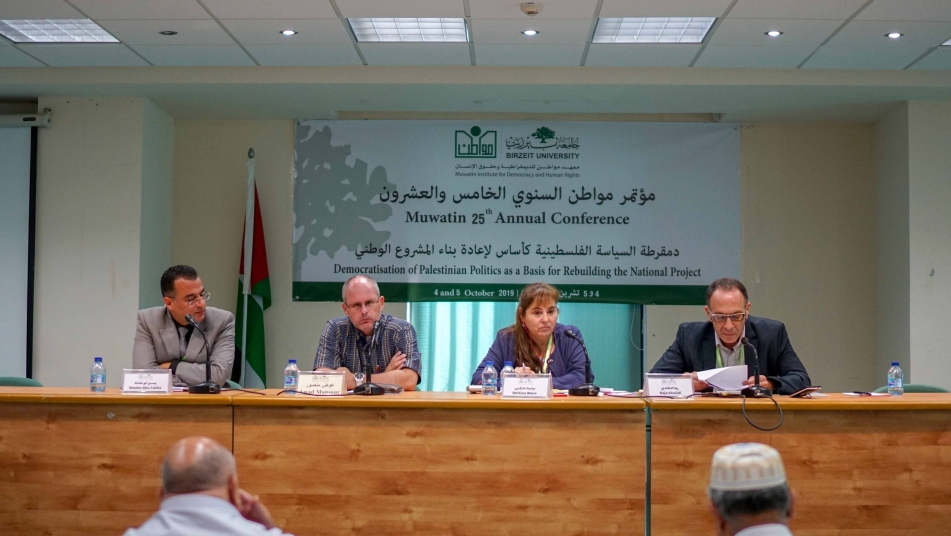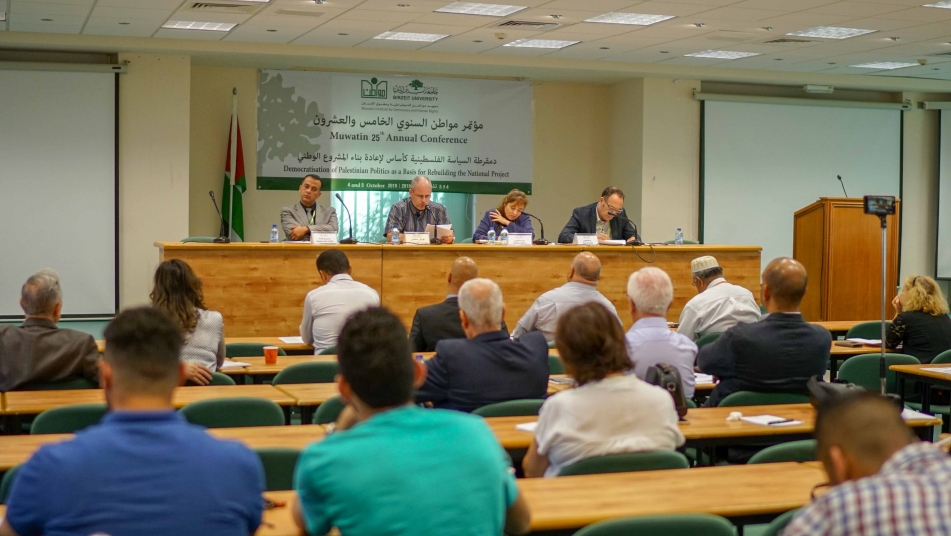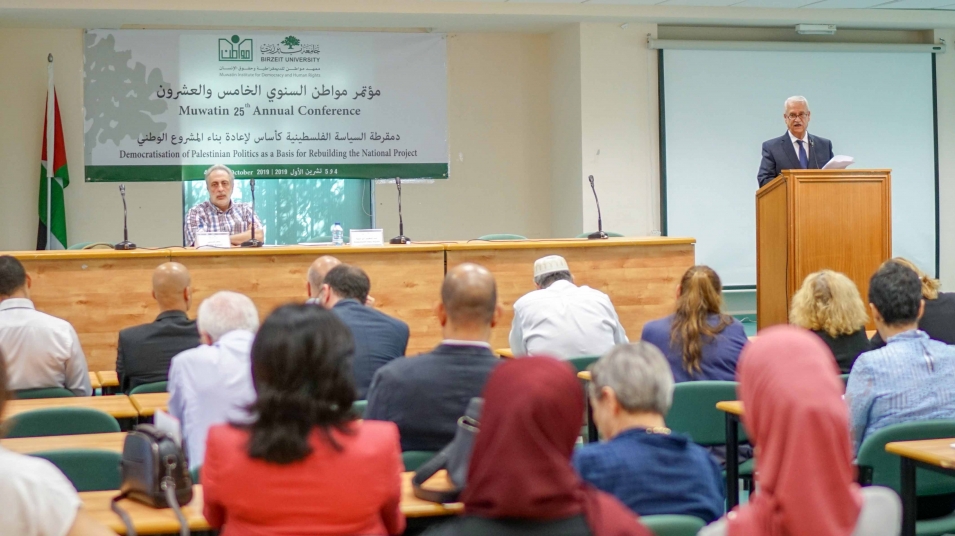Annual Muwatin conference evaluates, discusses means to rebuild Palestine’s national project
Muwatin Institute for Democracy and Human Rights at Birzeit University launched its 25th annual conference under the title “Democratizing Palestinian Politics as a Basis for Rebuilding the National Project” on October 4, 2019.
Birzeit University president Abdullatif Abuhijleh emphasized in his opening speech the importance of this event, especially amidst the challenges that the national project has been facing and with the Israeli occupation’s crackdown on education.
Praising the conference, Abuhijleh described it as an “important university tradition” and an embodiment of the conviction that “work and thought are linked, as the university and the Palestinian street are linked as well.” According to Abuhijleh, “the conference has become a platform to engage the rest of the world with our cause and provides an opportunity to build transnational solidarity.”
Director of the Muwatin Institute for Democracy and Human Rights Mudar Kassis talked about the institute's vision, emphasizing the necessity to reformulate the Palestinian national project and to counter the illusions that have permeated Palestinian society over the last few decades.
These illusions, according to Kassis, have worked to obfuscate the political reality and thereby entrench the loss of political objectives under the pretense of pragmatism. “Despite the myriad of changes in the region, the core of the world’s imperialism remains the same, and Palestine is a battlefield against the forces of imperialism,” Kassis stated. “The liberation of Palestine does not require negotiation but necessitates a wide international front to defeat imperialism,” he added, asserting that “We are in need of revolutionary change, not a cosmetic one.”
Mudar concluded his speech by thanking Dr. George Giacaman for his dedication to scientific and revolutionary research in Palestine and for his instrumental role in building Muwatin. He also thanked Heinrich Böll Foundation for its continuous support of the conference since its inception.
Representing Heinrich Böll Foundation, Bettina Marx chaired the first session titled “Approaches to Redefining the Palestinian National Project” which comprised a number of papers. The first, authored by Maha Al-Samman, faculty member at Al-Quds University, and presented on her behalf by Awad Mansour, also from Al-Quds University, carried the title “Palestine-Between the Colonial Space and the Right to Exist.”
Al-Samman’s intervention presented an alternative method of analyzing Palestinian and Israeli realities and offered a new way to inspect these realities by highlighting the strengths and weaknesses of the colonized and the colonizer. The intervention also made recommendations for building a Palestinian strategy based on the creation of a space that differs from colonial space.
The following paper ¾ presented by Wasim Abu Fasha, a faculty member at the Department of Philosophy and Cultural Studies at Birzeit University and titled “Back to The Beginnings: The Representations of Palestinian National Imaginary and the Failure of its Realization” ¾ focused on the representations of the Palestinian national imaginary and the changes that have taken place from the establishment of the PLO to this day, examining also the role of the Palestinian Authority in this process of re-imagination.
Raja Khaldi, research coordinator at the Palestinian Economic Policy Research Institute (MAS), concluded the first session with his paper on “Nation and Class: Generations of Palestinian Liberation.” He argued that the material conditions that have arisen in the midst of chronic clashes with settler colonialism have produced a new interpretation of the Palestinian liberation that challenges the exclusion and marginalization created by colonial domination. This requires a redefinition and new understanding of the liberation process, he argued.
Issam Al-Arouri, Director of Al-Quds Center for Legal Aid and Human Rights, chaired the second session that was opened by Muriel Asseburg, a fellow at the German Institute for International and Security Affairs in Berlin. In her presentation titled “The EU and its Member States and the Struggle for Palestinian Self-Determination and Israeli-Palestinian Peace,” Asseburg explained why Europeans have not played a more prominent role that would contribute to better achieving their goals; she described how the European approach has shifted from support of Palestinian self-determination and the construction of a democratic system of government to an approach that subordinates rights to the peace process.
Basem Ezbidi, a faculty member at Birzeit University, presented a paper titled “Are Palestinian Political Elites Part of the Impasse of the Palestinian National Liberation Project?” in which he explained how the Palestinian national project has stumbled due to structural and ideological attributes of the dominant elites and their decisions. Ezbidi also compared two different historical eras: the time of revolution and national struggle that preceded the Oslo period and the supposed creation of a “state” in the aftermath of Oslo.
Jeremy Wildeman, a faculty member at Bath University and at the University of Ottawa, presented a paper titled “Palestinian State-Building Denied: The Role of Western Donors in the Oslo Peace Process and Their Impact on the Palestinian National Project.” This paper highlighted the gap between the policies and visions of the major donors and the actual circumstances on the ground, as faced by Palestinians. He argued that the de-contextualization of these circumstances has led to a decline in the economic and social conditions of Palestinians.
Ending the first day of the conference, Mandy Turner, director of the Kenyon Institute, presented her paper “International Aid in the Absence of Palestinian Sovereignty” which sought to answer two questions that relate to the donors and to the Palestinian public, respectively. Regarding the donors, she explored what broader purpose their assistance to the OPT serves, given the gap between policy rhetoric and political reality. Regarding the Palestinian leadership and civil society groups, she questioned aid policies and their positive ¾ or negative ¾ impact in the absence of a move towards sovereign statehood.
The Muwatin conference will continue on Saturday, 5 October 2019, and will resume the discussion on issues related to the democratization of Palestinian politics and the construction of the national project.









